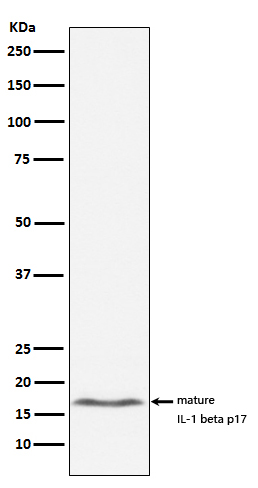
| WB | 咨询技术 | Human,Mouse,Rat |
| IF | 1/20-1/50 | Human,Mouse,Rat |
| IHC | 咨询技术 | Human,Mouse,Rat |
| ICC | 技术咨询 | Human,Mouse,Rat |
| FCM | 1/20-1/100 | Human,Mouse,Rat |
| Elisa | 咨询技术 | Human,Mouse,Rat |
| Aliases | Catabolin; IFN beta inducing factor; IL 1 beta; IL1; IL1B; IL1F2; Interleukin 1 beta; Interleukin 1 beta precursor; interleukin 1, beta; Osteoclast activating factor; Preinterleukin 1 beta; Pro interleukin 1 beta;;IL 1 beta |
| WB Predicted band size | Calculated MW: 31 kDa ; Observed MW: 31,28,17 kDa |
| Host/Isotype | Rabbit IgG |
| Antibody Type | Primary antibody |
| Storage | Store at 4°C short term. Aliquot and store at -20°C long term. Avoid freeze/thaw cycles. |
| Species Reactivity | Mouse |
| Immunogen | A synthesized peptide derived from mouse IL 1 beta |
| Formulation | Purified antibody in PBS with 0.05% sodium azide,0.05% BSA and 50% glycerol. |
+ +
以下是3-4篇关于IL-1β抗体的代表性文献摘要(已简化格式):
1. **"Targeting interleukin-1β in disease"**
- **作者**: Dinarello, C.A.
- **摘要**: 综述IL-1β在炎症性疾病中的作用,讨论抗IL-1β抗体(如Canakinumab)的临床疗效,强调其在类风湿关节炎和自身炎症综合征中的治疗潜力。
2. **"Anti-inflammatory therapy with canakinumab for atherosclerotic disease"**
- **作者**: Ridker, P.M. et al.
- **摘要**: CANTOS临床试验表明,Canakinumab通过中和IL-1β显著降低心血管事件,验证了IL-1β驱动动脉粥样硬化的假说,并证明其抗炎治疗的安全性。
3. **"Blockade of IL-1β signaling improves murine adaptive cellular immunity during sepsis"**
- **作者**: Netea, M.G. et al.
- **摘要**: 在小鼠脓毒症模型中,使用抗IL-1β抗体阻断信号通路可增强T细胞免疫应答,提示IL-1β抑制可能改善感染后免疫抑制状态。
4. **"Preclinical development of a novel anti-IL-1β antibody for inflammatory diseases"**
- **作者**: Brenner, D. et al.
- **摘要**: 报道一种新型抗IL-1β单克隆抗体的临床前研究,证明其在关节炎和结肠炎动物模型中有效抑制炎症因子释放并缓解病理损伤。
这些研究覆盖IL-1β抗体的机制、治疗应用及开发进展,适用于基础研究和临床参考。如需扩展,可进一步检索特定疾病或抗体类型的文献。
Interleukin-1 beta (IL-1β) is a pro-inflammatory cytokine central to innate immune responses, primarily produced by macrophages, monocytes, and dendritic cells. It plays a key role in mediating inflammation, fever, and tissue damage during infections, autoimmune diseases, and stress. Dysregulated IL-1β signaling is implicated in chronic inflammatory conditions like rheumatoid arthritis, gout, atherosclerosis, and type 2 diabetes, as well as autoinflammatory syndromes such as cryopyrin-associated periodic syndromes (CAPS).
IL-1β antibodies are therapeutic or research tools designed to neutralize IL-1β activity by blocking its interaction with the IL-1 receptor (IL-1R). Monoclonal antibodies like canakinumab (a human IgG1 anti-IL-1β antibody) have been clinically approved to treat CAPS, gout, and cardiovascular inflammation. These antibodies bind IL-1β with high specificity, preventing its pro-inflammatory effects and downstream signaling pathways (e.g., NF-κB activation).
Research-grade IL-1β antibodies are widely used in immunoassays (ELISA, Western blot), immunohistochemistry, and functional studies to elucidate IL-1β's role in disease mechanisms. The development of IL-1β-targeted therapies highlights its pathological significance, offering insights into cytokine-driven inflammation and validating IL-1β as a therapeutic target. However, long-term immunosuppression risks, such as increased infection susceptibility, necessitate careful clinical evaluation. Overall, IL-1β antibodies remain pivotal in both translational research and precision medicine for inflammatory disorders.
×